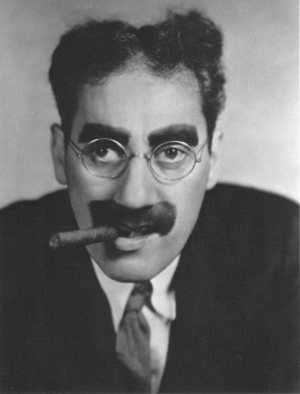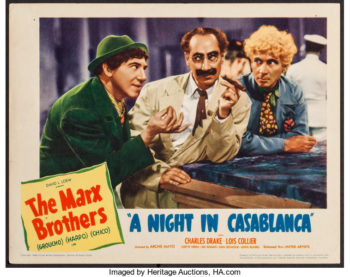The Casablanca Letters
 I think that Groucho Marx was one of the funniest men who ever lived. And I laugh out loud a the movies he made with his brothers. Well, most of them, anyways. I strongly recommend his book. The Groucho Letters. When word was making the rounds around 1944 that the boys were going to make a movie called A Night in Casablanca, Warner Brothers threatened legal action. Jack and the boys felt that this intruded in the territory of their Humphrey Bogart and Ingrid Bergman movie of a few years before. Casablanca was not yet remotely the classic it is regarded as today. But Warners didn’t want the Marx Brothers trying to make a buck off of their own film.
I think that Groucho Marx was one of the funniest men who ever lived. And I laugh out loud a the movies he made with his brothers. Well, most of them, anyways. I strongly recommend his book. The Groucho Letters. When word was making the rounds around 1944 that the boys were going to make a movie called A Night in Casablanca, Warner Brothers threatened legal action. Jack and the boys felt that this intruded in the territory of their Humphrey Bogart and Ingrid Bergman movie of a few years before. Casablanca was not yet remotely the classic it is regarded as today. But Warners didn’t want the Marx Brothers trying to make a buck off of their own film.
Groucho penned what has become a well-known letter to the Warners. It’s full of his great wit and is absolutely worth reading. It’s less well-known that he wrote a couple follow-up letters. Here are The Casablanca Letters – with a few footnotes from me.
Dear Warner Brothers:
Apparently there is more than one way of conquering a city and holding it as your own. For example, up to the time that we contemplated making a picture, I had no idea that the City of Casablanca belonged exclusively to Warner Brothers.
However, it was only a few days after our announcement appeared that we received a long, ominous legal document, warning us not to use the name “Casablanca”.
It seems that in 1471, Ferdinand (1) Balboa (2) Warner, the great-great grandfather of Harry and Jack, while looking for a shortcut to the city of Burbank, had stumbled on the shores of Africa and, raising his alpenstock, which he later turned in for a hundred shares of common (3), named it Casablanca.
I just don’t understand your attitude. Even if they plan on re-releasing the picture, I am sure that the average movie fan could learn to distinguish between Ingrid Bergman and Harpo. I don’t know whether I could, but I certainly would like to try.
You claim you own Casablanca and that no one else can use that name without their permission. What about Warner Brothers — do you own that, too? You probably have the right to use the name Warner, but what about Brothers? Professionally, we were brothers long before you were. When Vitaphone was still a gleam in the inventor’s eye, we were touring the sticks as the Marx Brothers and even before us, there had been other brothers — the Smith Brothers (4); the Brothers Karamazoff; Dan Brouthers (5), an outfielder with Detroit; and “Brother, can you spare a dime?” This was originally “Brothers, can you spare a dime” but this was spreading a dime pretty thin so they threw out one brother, gave all the money to the other brother and whittled it down to “Brother, can you spare a dime?”
The younger Warner Brother calls himself Jack. Does he claim that, too? It’s not an original name — it was used long before he was born. Offhand, I can think of two Jacks — there was Jack of “Jack and the Beanstalk”, and Jack, the Ripper, who cut quite a figure in his day. (6) As for Harry, the older brother, he probably signs his checks, sure in the belief that he is the first Harry of all time and that all other Harrys are impostors. Offhand, I can think of two Harrys that preceded him. There was Lighthorse Harry (7) of Revolutionary fame and a Harry Appelbaum who lived on the corner of Ninety-third Street and Lexington Avenue. Appelbaum wasn’t very well known — I’ve almost forgotten what he looked like — the last I heard of him, he was selling neckties at Weber and Heilbroner; but I’ll never forget his mother, she made the best apple strudel in Yorkville.
 We now come to the Burbank studio. This is what the Warner Brothers call their place. Old man Burbank is gone. Perhaps you remember him — he was a great man in a garden, he was the wizard who crossed all those fruits and vegetables until he had the poor plants in such a confused and nervous state, that they never were sure whether they were supposed to come in on the meat platter or the dessert dish.
We now come to the Burbank studio. This is what the Warner Brothers call their place. Old man Burbank is gone. Perhaps you remember him — he was a great man in a garden, he was the wizard who crossed all those fruits and vegetables until he had the poor plants in such a confused and nervous state, that they never were sure whether they were supposed to come in on the meat platter or the dessert dish.
This is just conjecture, of course, but, who knows — perhaps Burbank survivors aren’t too happy over the fact that a plant that grinds out pictures settled in their town, appropriated Burbank’s name and uses it as a front for their films.
It is even possible that the Burbank family is prouder of the potato produced by the old man than they are of the fact that from this town emerged “Casablanca” or even “Gold Diggers of 1931”. (8)
This all seems to add up to a pretty bitter tirade but I don’t mean it to. I love Warners — some of my best friends are Warner Brothers. It is even possible that I am doing them an injustice and that they themselves know nothing at all about this dog-in-the-Manger attitude. It wouldn’t surprise me at all to discover that the heads of Warners’ legal department know nothing about this dispute for I am acquainted with many of them and they are fine fellows with curly black hair, double-breasted suits and a love of their fellow man that out-Saroyans “Dr. Gillespie”. I have a hunch that his attempt to prevent us from using the title is the scheme of some ferret-faced shyster serving an apprenticeship in their legal department. I know the type — hot out of law school, hungry for success and too ambitious to follow the natural laws of promotion, this bar sinister probably needled Warners’ attorneys, most of whom are fine fellows with curly black hair, double-breasted suits, etc., in attempting to enjoin us.
Well, he won’t get away with it! We’ll fight him to the highest court! No pasty-faced legal adventurer is going to cause bad blood between the Warners and the Marxes. We are all brothers under the skin and we’ll remain friends till the last reel of “A Night in Casablanca” goes tumbling over the spool.
Sincerely,
Groucho Marx
Because Hollywood is a fantasy land, the letter from Groucho seemed to confuse Warners. Their legal department wrote back and asked for some idea of what the story was about. Seriously. Groucho, of course, couldn’t pass that up.
Dear Warners:
There isn’t much I can tell you about the story. In it I play a Doctor of Divinity who minsters to the natives and, as a sideline, hawks can openers and pea jackets to the savages along the Gold Coast of Africa.
When I first meet Chico, he is working in a saloon, selling sponges to barflies who are unable to carry their liquor. Harpo is an Arabian caddie who deals in small Grecian urn on the outskirts of the city.
As the picture opens, Porridge, a mealy-mounted native girl, is sharpening some arrows for the hunt. Paul Hangover (9), our hero, is constantly lighting two cigarettes simultaneously. He is apparently unaware of the cigarette shortage.
There are many scenes of splendor and fierce antagonisms, and Color, an Abyssinian messenger boy, runs Riot. Riot, in case you have been there, is a small night club on the edge of town.
There’s a lot more I could tell you, but I don’t want to spoil it for yo. All this has been okayed by the Hayes Office (10), Good Housekeeping and the survivors of the Haymaker Riots (11); and if the times are ripe, this picture can be the opening gun in a new worldwide disaster.
Cordially,
Groucho Marx
Amazingly, the Warners legal department STILL didn’t catch on. They replied again, explaining they still did not understand the story line and would Mr. Marx please explain the plot in more detail! Groucho was an obliging kind of guy.
Dear Brothers,
Since I last wrote you, I regret to say there have been some changes in the plot of our new picture, A Night in Casablanca. In the new version I play Bordello, the sweetheart of Humphrey Bogart. Harpo and Chico are itinerant rug peddlers who are weary of laying rugs and enter a monastery just for a lark. Th is is a good joke on them, as there hasn’t been a lark in the place for fifteen years.
Across from this monastery, hard by a jetty, is a waterfront hotel, chock full of apple-cheeked damsels, most of whom have been barred by the Hayes Office for soliciting. In the fifth reel, Gladstone makes a speech that set the House of Commons in an uproar and the King promptly asks for his resignation. Harpo marries a hotel detective; Chico operates an ostrich farm. Humphrey Bogart’s girl, Bordello, spends her last year in a Bacall house.
This as you can see, is a very skimpy outline. The only thing that can save us from extinction is a continuation of the film shortage.
Fondly,
Groucho Marx
That’s the last known letter regarding this issue. Either someone in the Warners’ legal department realized Groucho was pulling their leg; or, they simply gave up.
(1) – This refers to Ferdinand Magellan, the famous Portugese explore (who later signed with Spain as a free agent. He ‘discovered’ what was long the only route between the Pacific and Atlantic Oceans, in Chile. The Strait is named after him.
(2) – Vasco Nunez de Balboa was a Spanish conquistador who crossed the Isthmus of Panama to the Pacific Ocean, in 1513. Instead of just saying ‘Christopher Columbus Warner,’ Groucho showed his knowledge by taking a name from two different explorers and appending ‘Warner’ on the end.
(3) – A jab in the ribs at the movie moguls’ money drive.
(4) – Presumably referring to the makers of the first cough drops widely known in the United States.
(5) – Great-hitting Hall of Fame outfielder in the 1880’s and 1890’s, with a lifetime batting average of .342
(6) – A Jack the Ripper joke!
(7) – Father of Confederate General Robert E. Lee.
(8) – A 1933 musical that was Warners biggest money-maker that year.
(9) – Poking fun at Casablanca’s Paul Henreid, who famously lit two cigarettes at once (giving one to Bette Davis) in Now Voyager.
(10) – The Hays Code (Properly known as The Motion Picture Production Code) was a set of movie guidelines that the film industry promulgated as a form of self-censorship. Will H. Hayes was the Presient of the Motion Picture Producers and Distributors of America from 1922 to 1945. Scripts were run by the Hays Office for approval. Comments to objectionable material were given back. Hollywood was seen as morally lacking around 1920, and to mitigate political and social pressure being received, turned to Hays, a Postmaster General under Warren G. Harding.
(11) An 1886 protest in Chicago’s Haymarket Square turned into a riot, with fatalities.
 Bob Byrne’s ‘A (Black) Gat in the Hand’ was a regular Monday morning hardboiled pulp column from May through December, 2018 and again from August through December, 2019. It returned in June, 2020.
Bob Byrne’s ‘A (Black) Gat in the Hand’ was a regular Monday morning hardboiled pulp column from May through December, 2018 and again from August through December, 2019. It returned in June, 2020.
His ‘The Public Life of Sherlock Holmes’ column ran every Monday morning at Black Gate from March, 2014 through March, 2017 (still making an occasional return appearance!).
He organized ‘Hither Came Conan,’ as well as Black Gate’s award-nominated ‘Discovering Robert E. Howard’ series.
He is a member of the Praed Street Irregulars, founded www.SolarPons.com (the only website dedicated to the ‘Sherlock Holmes of Praed Street’) and blogs about Holmes and other mystery matters at Almost Holmes. That’s also the name of his podcast.
He has contributed stories to The MX Book of New Sherlock Holmes Stories – Parts III, IV, V, VI and XXI.
He has written introductions for Steeger Books, and appeared in several magazines, including Black Mask, Sherlock Holmes Mystery Magazine, The Strand Magazine, and Sherlock Magazine.
Although there is absolutely no indication that these letters were ever sent or that they were anything other than a publicity stunt by Groucho.
It sounds more like Groucho than a couple of those dud movies. I love the humor.
I don’t know exactly what ‘a Bacall House’ is, but I like the sound of it…
This is hilarious, Bob. I remember reading ‘Groucho and Me’ years ago and being struck by how well he wrote, on a purely nuts-and-bolts level.
My father had a book consisting entirely of the various memos sent by various people working for Warner – which I’m guessing you probably have – detailing the prolonged development of Casablanca (or ‘Rick’s Place’ as it was then) plus people like Errol Flynn grousing about the unrealistic wig he had to wear for Robin Hood etc, etc.
[…] THE BURBANK LETTERS. At Black Gate, Bob Byrne reacquaints fans with Groucho Marx’s “The Casablanca Letters”. (And for a much fuller explanation, consult […]
Aonghus- Groucho and Me is a great book. I got this stuff from The Groucho Letters, which is full of correspondence to and from him. He was an incredibly funny and witty man. The letters are great.
I don’t know that Warners book. Do you know the name?
I’ll be visiting my parents this Xmas (at a safe distance, naturally) so I’ll have a look around for it – I used to dip into it every now and then; it was a big, fat paperback, as I recall.
Bob and Aonghus — “Inside Warner Brothers” by Rudy Behlmer?
Yeah, I think that’s the one, Smitty. I had no luck finding it in my parents’house, but that cover – the Simon & Schuster/viking edition – looks very familiar. Hard to believe it came out in ’85!